Chef shares passion for cooking for complex-needs patients as part of Neurodiversity Celebrations
A chef has spoken of her passion for working with the patients she cooks for at a specialist unit for people with complex needs.
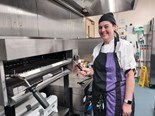 Mandy Hopkins is the full-time chef at Byron Court in Billericay, an assessment and treatment unit for adults who have a learning or developmental disability and mental health difficulties.
Mandy Hopkins is the full-time chef at Byron Court in Billericay, an assessment and treatment unit for adults who have a learning or developmental disability and mental health difficulties.
Many of the people cared for have complex needs and go on to receive specialist support in the community.
During their time at Byron Court, they are supported a team including doctors, nurses, psychologists, healthcare assistants, occupational therapists, a speech and language therapist, and activities co-ordinator.
Food also plays an important part in the personalised care for each patient, as they have different health needs and preferences for certain foods and textures. Good nutrition is also important because weight gain is a side effect of some medications, which can lead to other health problems.
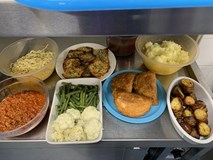 Mandy cooks meals from scratch and tailors them to each patient’s needs, and will cook individual meals where needed.
Mandy cooks meals from scratch and tailors them to each patient’s needs, and will cook individual meals where needed.
She has also learned Makaton, a system of using symbols and signs, to communicate with a patient who has autism and is non-verbal.
“I haven’t done a Makaton course, I’m self-taught, and I will ask him to sign to me what he would like to eat,” said Mandy, who has worked at Byron Court for eight years.
“Our speech and language therapist gave me a book of signs to help us communicate.
“Our patient likes to see what is on the menu, so I will use the book to show him.
“I’ve learned a lot about Makaton from him.”
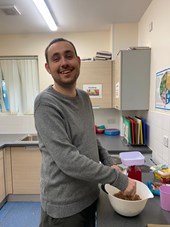 Mandy involves patients in creating the menus, which change each week and include meals such as Cajun chicken, jollof rice, spaghetti Bolognese, roast dinners and homemade burgers.
Mandy involves patients in creating the menus, which change each week and include meals such as Cajun chicken, jollof rice, spaghetti Bolognese, roast dinners and homemade burgers.
“I write the menus and sit down with our patients and ask them what they want to eat,” she said.
“I have a folder containing their requests and we only have chips once a week on a Friday.
“I try to cook as healthily as possible and have fresh fruit available.
“We try to encourage patients to snack on fruit and their families also bring them in their own snack boxes.”
There is also an assisted kitchen, where they can make their own toast and serve cereal and yoghurt with supervision from staff.
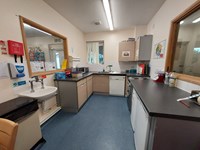 Mandy cooks up feasts for special occasions, such as Christmas and Easter, and she and her colleague cook meals including international dishes to introduce patients to foods they may not have tried before.
Mandy cooks up feasts for special occasions, such as Christmas and Easter, and she and her colleague cook meals including international dishes to introduce patients to foods they may not have tried before.
Mandy makes them birthday cakes and also works with the activities co-ordinator Leah Chitty to plan supervised cooking activities for the patients, such as making pancakes.
“I enjoy interacting with our patients. We’re like a little family here, everyone is so friendly.
“A lot of the staff have worked here for many years and it is like a home from home, not a hospital.”
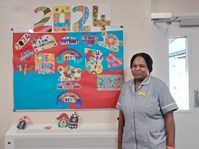 It is a view shared by Nursing Associate Patience Haukozi, who said: “I started here as a student nurse and decided to stay because I like the one-to-one engagement with the patients.
It is a view shared by Nursing Associate Patience Haukozi, who said: “I started here as a student nurse and decided to stay because I like the one-to-one engagement with the patients.
“I get to learn more about them as individuals and I now know more about learning disabilities than I did before.
“It’s amazing how we can make a difference to someone’s life. We have people come in who are unwell and upset, and we have people who come here under section too.
“It’s exciting when we see them doing so well and feeling better.”
This week is international Neurodiversity Celebration Week (18 to 24 March), which challenges stereotypes and misconceptions about neurological differences and celebrates difference.
Find out more on the Neurodiversity Celebration Week website.
#WeCare - We want everyone who uses our services to have the best possible experience. Our care will be therapeutic, tailored to each patient’s individual needs, and focus on what they need to feel better.
Our five-year Strategic Plan sets out our priorities and commitments to deliver the highest quality and safest care possible.
